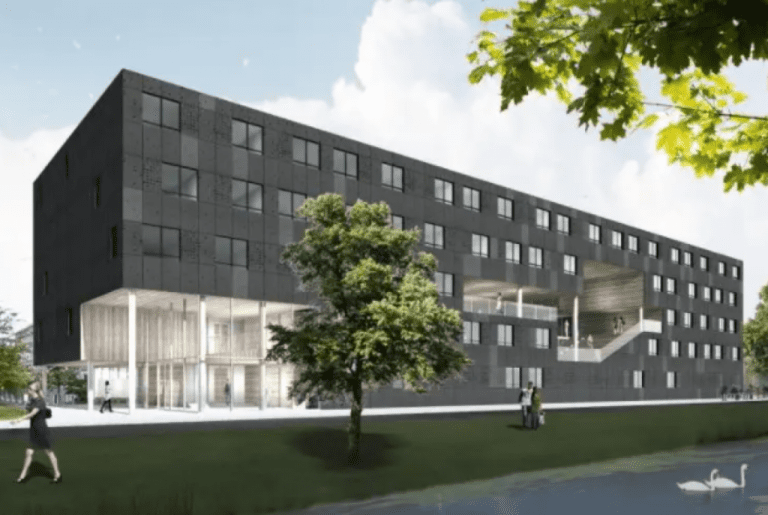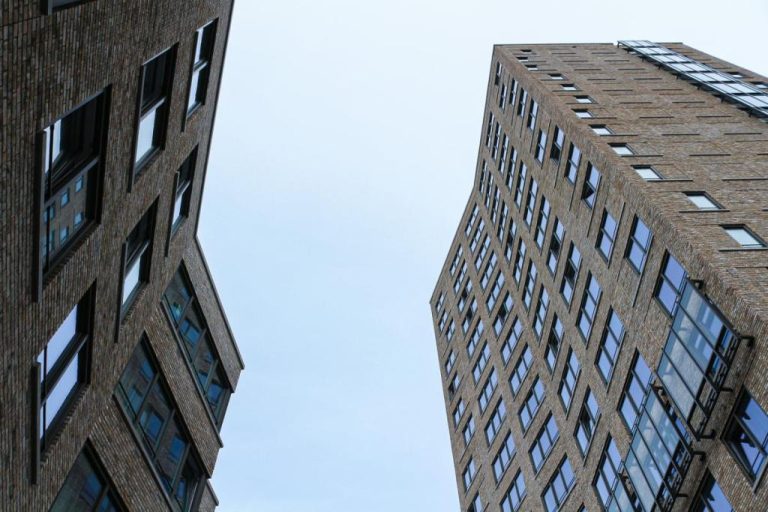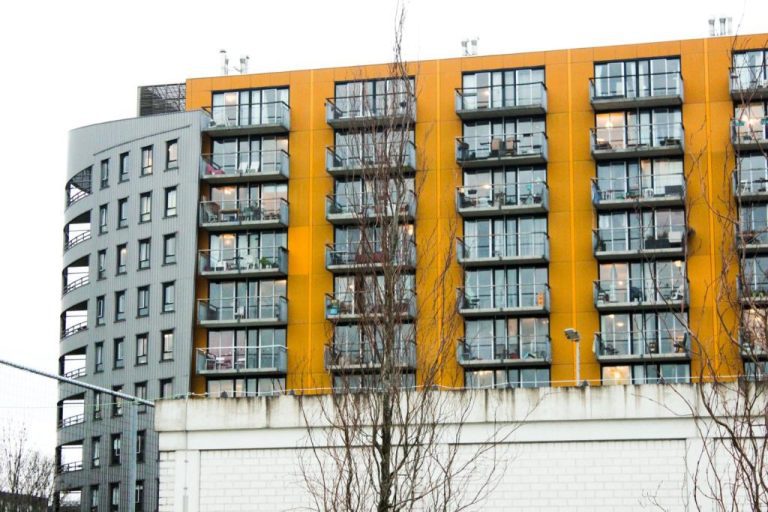Mention the term ‘shortage of rooms’ and fingers automatically point to international students. Are they the cause or the scapegoat?
(Illustration: Liam van Dijk)
In this investigative journalism long read, you will read:
- Research by Delta shows that internationals are not the cause of the room shortage, while they are often blamed.
- Over the last five years, the building of student accommodation has dried up while dividing houses into rooms, and dividing up homes in general are banned.
- That so little has been built is partly due to the Municipality’s low building goals. Those ambitions were based not only on faulty predictions, but also on wishful thinking by the TU and creative use of figures.
- As sites for construction are scarce in Delft, the Municipality is increasingly pushing for more student accommodation on campus. Despite the pressure, no student accommodation was added to campus after 2017. TU Delft chose companies rather than housing on Campus Zuid.
- That position has recently changed. Duwo, the student housing company, the Municipality and TU Delft’s Board are now discussing new housing units on Campus Zuid.
- This article contains a number of star symbols (*). These are links you can click on for underlying information.
TU Delft student Finn is nervously biting his nails. Another rejection email in his inbox. He has now been looking for a room for five months, but as yet has always received no for an answer. Time and time again. And that while time is passing. In one month’s time he has to leave his studio close to TU Delft campus. The closer the end of his contract comes, the more uneasy Finn becomes. What should he do if he does not have a room? He cannot live with his parents as he comes from Germany.
He is not the only one whose search for a room is not turning up anything. The Delta Editorial Office receives several emails from desperate students every year. TU Delft teachers too see their students struggling. “I even have international students who do not get round to studying as they do not know where they will sleep next week,” TU Delft teacher Margreet Docter had previously told Delta. At the moment the shortage of rooms across the country is 26,800 units, calculated Kences, the student accommodation providers interest group. This equates to between 1,100 and 1,500 rooms in Delft.*
Favourite subject
The ever rising shortage of rooms is a favourite subject in the media every year. And ever more fingers point to the flow of international students. ‘Shortage of rooms rises fast because of the high numbers of international students’, was the heading of a Volkskrant article (in Dutch) last year after a press release by Kences. At the NOS (in Dutch) a Kences spokesperson explained that international students are largely responsible for the shortfall in student accommodation. In 2021 Kences also issued a press release which makes the connection between the shortage of rooms and international students: ‘Ninety-five percent of the rising shortage can be explained by the increasing number of international students’. The press release was part of the Landelijke Monitor Studentenhuisvesting 2022 (national student accommodation monitor), an annual assessment of the student accommodation market. Kences did not substantiate the claim either in the press release or in the Monitor.* What is clear is that the statement mostly refers to the future: the 95% refers to 2029-2030 and is thus a forecast, a nuance which is completely lost in the Volkskrant report. Research by Delta shows that the situation in Delft is a lot more nuanced.
Years of recruitment
First the student population. That the number of international students has grown significantly in recent years is undeniable. Attracted by the high quality of university education in the Netherlands and the relatively low tuition fees, more and more international students are making their way to the Netherlands.* Look at the graphics:
That so many internationals find their way to the Netherlands is no coincidence. Both universities and the Government have made efforts to recruit international students for many years. The ministries and academic institutions believe that these students are good for the quality of education, even though they have hardly substantiated that claim, says De Correspondent (in Dutch). The Ministry of Education, Culture and Science has, for example, stimulated ‘the internationalisation of education’ since at least 1985, and in 1997 even came up with a special ‘action plan’. For the first time, the plan, entitled ‘Onbegrensd Talent’ (unlimited talent), states that attracting international students is a policy goal. In 2000 the Netherlands even set up Netherlands Education Support Offices in Jakarta, Beijing and Taipei. The Netherlands Education Support Offices support the internationalisation activities of higher education institutions.
The love for international students is declining
In 2013, in a strategic document Erasmus University wrote: ‘Internationalisation is considered necessary as the national financing of education and research is declining’. Just like Rotterdam, TU Delft put much effort into attracting international students, research by Delta shows. In 1996, TU Delft took part in an international education fair to attract students. The fair was in Indonesia, to be precise. A year later, TU Delft started recruiting in China and introduced its first English language master’s. Three years later, TU Delft held a ‘promotional tour’ in South India. ‘Since that year the inflow of Indian students has risen continuously and, in terms of size, they are now in second place’ states a 2004 document* which outlines the international recruitment policy of TU Delft. Thirteen years later, in a strategic multi-year plan, TU Delft looked back on the course it took up to that point. ‘We also worked on improving our international visibility. This has led to an increase in the number of international students (19%) and academic staff (53%).’
Packed lecture halls
No wonder that more and more English is emerging from Dutch lecture halls. But the love for international students is declining. And quickly. If only we were not so popular in other countries, sighed rectors and deans at universities from Maastricht to Groningen in 2022 in the Dutch media. Or, as a spokesperson from the Universities of The Netherlands umbrella organistion recently said in the AD newspaper (in Dutch): “We are a very attractive country for international students because of the high quality of the universities. But the disadvantage is that the current high flow in some places is affecting the quality of the education and housing is highly problematic.” In short: while universities initially associated international students with a high quality of education, over the last few years that association has mostly become overly full lecture halls and a shortage of housing.
In August 2021, the Financieele Dagblad (in Dutch) talked to university spokespersons who revealed that most universities in the Netherlands have stopped ‘actively recruiting’ international students, although an article in the members’ magazine of the Algemene Onderwijsbond (in Dutch) shows otherwise. ‘A lot of universities still hold online fairs and digital recruitment events and some universities still work with local recruitment agencies that are paid for each student they deliver.” TU Delft has also stopped recruiting, but a spokesperson is unable to say what year this happened.
Construction of student housing virtually dried up in last five years
Still, the growth in the number of internationals is not the whole story. The shortage of rooms is not only a future problem, it is here now. The city of Delft is facing a shortfall of between 1,100 and 1,500 student rooms. A municipal forecast estimates that this shortfall will increase to 3,600 rooms by 2028. All the other large and medium-sized student towns face a shortage of rooms too. Research by Delta shows that over the last five years in particular, the building of student accommodation has dried up. This is partly because of developments which is outside almost everyone’s control. Land is expensive and scarce, the residents of an area sometimes submit official objections, and cities have building commitments for other groups too, such as subsidised housing.
Still, Delta found that there are other issues at play too. The building code for student rooms in Delft are partly based on shaky analyses*, the creative use of figures, a large amount of wishful thinking, and a one-track minded TU Delft which favoured companies above student housing for a long time.
How did it get this far? To answer this question, we will first look at Delft’s student housing market. The largest part of the market is in the hands of large housing providers such as Duwo.*
About 45% of the students in Delft live in accommodation provided by Duwo and other large housing providers, and at least 38.5%* in accommodation provided by other suppliers such as student associations, private homes or private landlords. It is virtually impossible to check what has been added over the years by the other suppliers as the Municipality has very little information. At 38.5%, the student housing supplied by the other types of suppliers is a sizable chunk of the market.
But it is just these types of rooms that the Municipality started restricting five years ago. In 2017 the city started making dividing up houses into rooms difficult through the ‘omzettingsvergunning’, a permit required to convert houses for good reason. More and more houses that were originally built for families were being bought up by investors and converted into student rooms. This had a major impact on the people living in the area.
In the summer of 2021, Delta spoke to people in Delft who were one of the last non-students in their street. When it looked as though the omzettingsvergunning would lead to house division on a massive scale, the Municipality introduced a new ordinance, this time to prevent house division.
Bats and objections
While the measures were intended to protect homes, in both 2017 and 2021, STIP, the local student political party, and VSSD, the TU Delft students union, warned about knock-on effects including that student accommodation would suffer.
And while the growth in the private sector was made more difficult, projects by social housing providers were also affected. In 2019, 2020, 2021 and 2022 Duwo did not build any new student accommodation*. Tom Hoekveld, the Director of Duwo, explains why. “Land is scarce. Where we can, we redevelop on the sites we already have. As a social student housing provider, we cannot offer as much for new sites to build on as the market can.” He continues. “This means that we are dependent on the goodwill of other entities like the Municipality and TU Delft.” More about the goodwill later.
In response to Delta’s line of questioning, Hoekveld shares a piece of news: the building of Balpol4, a student flat containing 136 units that has been on the cards since 2013, will start this year. The building work experienced delays because of bats and objection procedures.
 An impression from 2013 of what BalPol4 will soon look like. (Illustration: Studioninedots + HVDN)
An impression from 2013 of what BalPol4 will soon look like. (Illustration: Studioninedots + HVDN)
See the table below for what Duwo and other housing providers have recently added*. In 12 years time, 4,819 rooms have been added by housing providers such as Duwo, Xior and Camelot. Apart from these, student housing has been added to the market through other means such as converting large student rooms into several smaller rooms. By doing this, Duwo was able to supply an additional 763 student units. The ‘building list’ as of 2010 is as follows.
The Municipality partially expressed the building plans of the table above over the last 15 years in ‘woonvisies’ (housing visions), or multi-year plans in which the Municipality discussed the development of the city in terms of population, urbanisation and types of housing, and then connected building goals to them. In its Woonvisie 2008-2016, the Municipality referred to a ‘desired increase of 3,600 units for students and others up to 2016’.
A new type of municipal document was added for 2012 onwards (in Dutch): the woningbouwmonitor (housing building monitor). The city of Delft records what has transpired from its building goals. The Municipality’s conclusion time after time is that it is on track with student accommodation. The year’s goals have been achieved and looking forward, the Municipality is on course to achieve its future goals. ‘The supply of 2,000 student housing units in the Woonvisie will, with what has been achieved and the ‘hard’ plans yet to be made, be achieved’, writes the Municipality in the Woonmonitor 2018.
Creative bookkeeping
Some level of creative bookkeeping is needed for this conclusion. The Woningbouwmonitor* of 2012, 2014, 2016, 2018, 2020 and 2021 all state that the Pauwmolen is one of the reasons that the Municipality’s objectives for student accommodation will be achieved. In the end, this block of flats with 143 student housing units was only delivered in 2021. But in 2022, these same units were once again included* in the goal given in the ‘Studentenhuisvesting in goede banen’ (student accommodation on track) to build an extra 2,500 student housing units by 2026. It also transpired from questions addressed to a press spokesperson that the Municipality barely had any idea of the scale of the shortage of rooms between 2000 to 2021.
 The Pauwmolen residential flat has been included in municipal building targets for several years. (Photo: Justyna Botor)
The Pauwmolen residential flat has been included in municipal building targets for several years. (Photo: Justyna Botor)
The Municipality’s building goals also include figures that are repeatedly overtaken by reality. The building plans were initially – from 2008 up to at least 2012 – based on TU Delft’s own estimates of the growth of the number of students. Later, figures from Kences were added that forecast the number of students across the country from 2012 so that the building plans can better meet the housing needs.
However, both Kences’ and TU Delft’s forecasts were proven wrong year after year as the growth in the number of students was continuously higher than expected. In the case of Kences, this was because for years there had been an error in the Government’s reference framework on which the advocacy organisation had been basing its forecasts. The error was discovered and repaired in 2021.
Some predictions are based on wishful thinking
Kences uses various statistics, including from the Central Bureau of Statistics (CBS), on the number of young people that are doing HAVO (higher general secondary education) or VWO (pre-university education) and statistics from the Ministry of Education, Culture and Science. TU Delft’s predictions appear to more firmly grounded on wishful thinking than on statistics. ‘Studentenhuisvesting in goede banen’* (well organised student accommodation), a Municipality analysis from 2019, states that one of TU Delft’s ‘ambitions’ is to ‘grow to 28,000 students’ by 2027.
However, Dutch universities may not refuse students. The maximum growth is thus more of a desire than a policy. In the policy document, the civil servant goes on to say that ‘At present, TU Delft’s ability to control the growth is limited.’ That figure of 28,000 will also not only be achieved in 2027: TU Delft currently already has 28,000 students.*
 (Illustration: Liam van Dijk)
(Illustration: Liam van Dijk)
In the meantime, however, this information didn’t lead to adapting the building plans. On the contrary, in the same document, the Municipality, TU Delft and Duwo are linking new building goals to that unrealistic 28,000 student goal. ‘Having assessed the figures, the Taskforce (an alliance of the Municipality, TU Delft and Duwo, Eds.) has opted to set the objective of building at least 2,500 student units up to 2026.’
This objective has been slightly amended since the 2022 Coalition Agreement (in Dutch) which now states that the objective is to build 3,500 student housing units up to 2030. Most of these places have yet to be found (in Dutch). The Delft branch of the D66 political party recently calculated (in Dutch) that even after building 3,500 more housing units, the city will still have a shortfall of about 2,000 student housing units.
The Municipality has its eye on a possible building site outside Delft for some of those 3,500 housing units. The City Council has been in discussions with surrounding municipalities, such as Schiedam, since 2020. About 450 student houses may be built there in the next few years.
The above mentioned Student Accommodation Taskforce has been called ‘administrative consultation on student accommodation’ since 2022 and meets about three times a year. That despite the consultation meetings it is not always easy to plan and get housing built is clearly demonstrated by Balpol4 which underwent a delay of at least 10 years.
Building on campus discouraged
The local politicians in Delft are looking more and more at TU Delft campus. At present, the campus and its adjoining area contain 3,365* housing units that are managed by Duwo.. The total area owned by TU Delft is 161 hectares and it is not yet fully built on, especially Campus Zuid. ‘There is still plenty of space’, asserted most political parties during the elections last year.
In previous policy plans – in 2016, 2018 and 2020 – the Municipality had stated that it was important to build student accommodation on campus and that it was ‘in talks’ with TU Delft.*
Despite that societal pressure, TU Delft was reluctant to do this in the past. Since 2017 no housing has been added on TU Delft ground. According to an insider, this is partly because the Executive Board took a very cautious position. Former TU Delft employees anonymously confirmed that one of them had said that “We wanted companies on Campus Zuid, not student accommodation”.The Executive Board repeatedly links its preference for companies to Dutch universities’ need for valorisation. The Universities of The Netherlands umbrella organisation defines (in Dutch) valorisation as ‘the societal use of knowledge, for example through wide television audiences or partnerships with the Government, establishing start-ups, and obtaining patents’. A wide interpretation indeed. In contrast, TU Delft has explicitly chosen for a commercial explanation.*
Still additional housing on Campus South
Vice-Rector Magnificus Rob Mudde explains that the Executive Board’s reticence has recently given way for a more open position. “This means that we are now in discussions with Duwo to see if we can build 1,000 homes on Campus Zuid in the near future.” It had previously been made known that both bodies were discussing 660 temporary homes. This means an extra 340.
Whether the housing will be temporary or permanent has not yet been confirmed. “But in any case for more than 15 years,” says Mudde. The Board member also says that an additional 1,000 homes may be built in the longer term. “There would also be other amenities so that living there would be attractive to students.”
Why can those additional student accommodation units not be built sooner or now on campus? Mudde cites various reasons. “We had hoped that the building of student accommodation in surrounding municipalities would get off the ground quickly, but it appears to be a challenge for those municipalities too.” He adds that “Our view on student accommodation has also been coloured by the ‘Contouren 2030’ plan.” Mudde refers to the growth strategy that the Executive Board announced in September 2022 which involves preparing for an increase to 40,000 students spread across several cities such as The Hague and Rotterdam.*
Mudde refers to the growth strategy that the Executive Board announced in September 2022 which involves preparing for an increase to 40,000 students spread across several cities such as The Hague and Rotterdam.* “To date we have always worked on managing the number of students. As we do not have any means to refuse students, that makes no sense. If you look at the national forecast, the growth in the number of students is unavoidable. So we need to first plan for that growth instead of that growth just happening to us.”
 A student flat on the TU Delft campus. (Photo: Dalia Madi)
A student flat on the TU Delft campus. (Photo: Dalia Madi)
Students should not picture a campus full of blocks of flats. “A significant part of Campus Zuid is already largely reserved for new developments such as new academic buildings so there is a lot less empty space than outsiders see. The only place where there are large sites available are the back of the southern campus.”
‘I can give no guarantee beyond the front door’
In 2016 TU Delft signed a covenant with the Municipality in which they promised (in Dutch) to work together on student accommodation. Despite this, only one block of flats has been built on campus since then, and that block was already on the plans.
To the question of whether TU Delft could guarantee that there will definitely be student housing this time, Mudde is crystal clear. “I can give no guarantee beyond the front door. Building student accommodation is complicated. Just look at Balpol4. Everything was ready to start building, but objection procedures by neighbourhood residents caused a lot of delays. This happens a lot with building plans. They quickly get stuck on issues around how the Netherlands is organised and the co-interests at play. We have to respect the process.”
Waiting list
An investigation by the Hoger Onderwijs Persbureau (higher education press agency, in Dutch) in January 2023 showed that the waiting list for accommodation at Duwo in Delft has risen to 56 months.*
Does Mudde believe that TU Delft is partly responsible for this long waiting list because of its former reticence? “Of course I could say that the waiting list would have been shorter if we had had 10,000 homes built. But an answer like that does not take account of the complexity of the story. Building housing is complicated. Every year there are international students who do not come to TU Delft because they cannot find accommodation. If we had built the housing, I believe that it would have led to an even greater number of international students and thus a larger number of TU Delft students. Everything is interconnected. Furthermore, we grow by about 850 students every year. This means that you would have to build large blocks of flats every year. It is impossible to keep up with this number. My message to students is truthful: we do see the problems that students face in terms of student accommodation, but there is no quick fix.”
If Delta’s investigation makes one thing clear, it is that this last statement is right. And definitely if housing market analyses fluctuate widely, figures are used creatively, building sites are scarce – in part because of TU Delft – and the Municipality restricts private rentals. Is this the fault of the international students who you see walking the streets every day? This investigation shows that this is not the case. They are the scapegoat.
And what about Finn, the international student from Germany? He luckily managed to find a place in Rotterdam. “It is far away, but I am happy that I found something.”
Research: Marjolein van der Veldt and Annebelle de Bruijn. This article came about with the financial support of the Mediafonds Delft (in Dutch).
Response Municipality of Delft
‘The Municipality of Delft recognises the scenario of increasing student numbers and the associated increasing shortage of rooms. Student accommodation is part of Delft and it is included in our new build programme. The Coalition Agreement of the current Municipal Executive mentions the building of 3,500 new student housing units, partly on and around campus, partly at small scale elsewhere in the city or in the surrounding region.
The building of student housing has lagged behind the targets over the last few years. Building in a densely populated city is complex. We expect the delivery of BalPol4 and the renovation of and increasing the number of rooms some of Duwo’s existing complexes. Further, about 475 student housing units will be built during the first phase of the Kabeldistrict project.
We also have high expectations of building on and around campus. We are in discussion with TU Delft about some speficic locations for student accommodation. TU Delft is also affected by the shortage of rooms and we are both thinking innovatively about the future of the campus.
Further, we are also considering temporary student accommodation in existing buildings or in flexible buildings. More temporary student housing is underway in Rijswijk, within cycling distance or a 10 minute train ride from TU Delft, than had previously been anticipated. Plans are also being made in Schiedam.
This spring, the issue of room rentals in private homes will be looked into. This will increase the supply of rooms in private properties without the disadvantage of unbridled house division which would push out other home seekers and put a heavy burden on neighbourhoods. Delft may be a student city, but the rest of the population is also being affected by a housing shortage. We thus also need to build housing for non-student young people, first time job seekers, other households who want to move on, senior citizens, and groups needing special care.’
Do you have a question or comment about this article?
a.m.debruijn@tudelft.nl


Comments are closed.